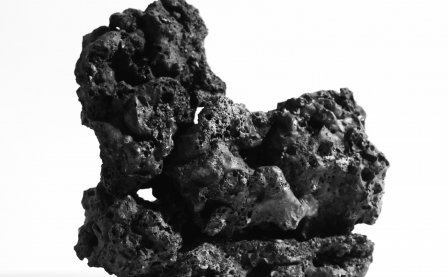Spooky, the roaring of this stethoscope: a sort of inverse-Necks, Imbogodom compress sprawling ideas into dense pieces, their instructive interview with John Crowell disclosing how they submit their own studio recordings to the psychedelic stochastics of tape manipulation in a recursive loop of making and listening.
What is manipulated is the real, rather than the symbolic, producing what Kittler might have called “a strange and unheard-of silver noise… the voice of the listener who makes no sound and is nonetheless supposed to sing once all the conditions of magic have been met”: on “I Am Here, I Am Gone” and “Slate Grey Light,” Alexander Tucker is precisely this silent listener, incanting along with the studio magic of co-conspirator Daniel Beban: winds slowed to inhuman yawns; strings scrambled into Twombly scrawls; stabs of Tucker’s voice, slowed and sped-up, bleeding through a reverb gauze. Chopped and screwed? More slurred and slewed.
The spectrum of noise circumscribes an indiscriminate bundle of frequency-lines, whose varying articulations carry morphological implications. Barthes wrote of Twombly: “His work is based not upon concept (the trace), but rather upon an activity (tracing).” Similarly, Imbogodom’s tweaks, slices, smudges, and stitches are perhaps a tracing in the spirit of Rilke’s “Primal Sound” hypothesis — “What variety of lines, then, occurring anywhere, could one not put under the needle and try out? Is there any contour that that one could not, in a sense, complete in this way and then experience it, as it makes itself felt, thus transformed, in another field of sense?” — a series of technical, poetic experiments in laboratory conditions.
First, a “saturated expression of the manifestation of inwardness”; second, “a disappearing of being in the act of being”: Hegel’s dual definition of sound seems relevant here, as sound has become the raw material of introspection. When you discover that “Red Brick Roundhouse” and “Nuclear Wind” are grounded in field recordings, it makes total sense. Despite/because of its reliance upon general principles, And They Turned Not When They Went is a hymn to improvisational specificity. We’re left with a melancholy erotics of noise, Deerhunter’s “Tape Hiss Orchid” concept brought to life in a teeming — a crawling — a gnashing of acousmatic forms, haunted by Burroughs’ lumberjack spirit.
More about: Imbogodom



